Millions in grants fuel dynamic research projects
Studies address such conditions as opioid use disorder, liver disease,
spinal injury, neurological disorders, and many more
The University of Rhode Island College of Pharmacy researchers have attracted millions in federal grants over the last year. Here is a look at the college’s dynamic researchers and their funded studies:
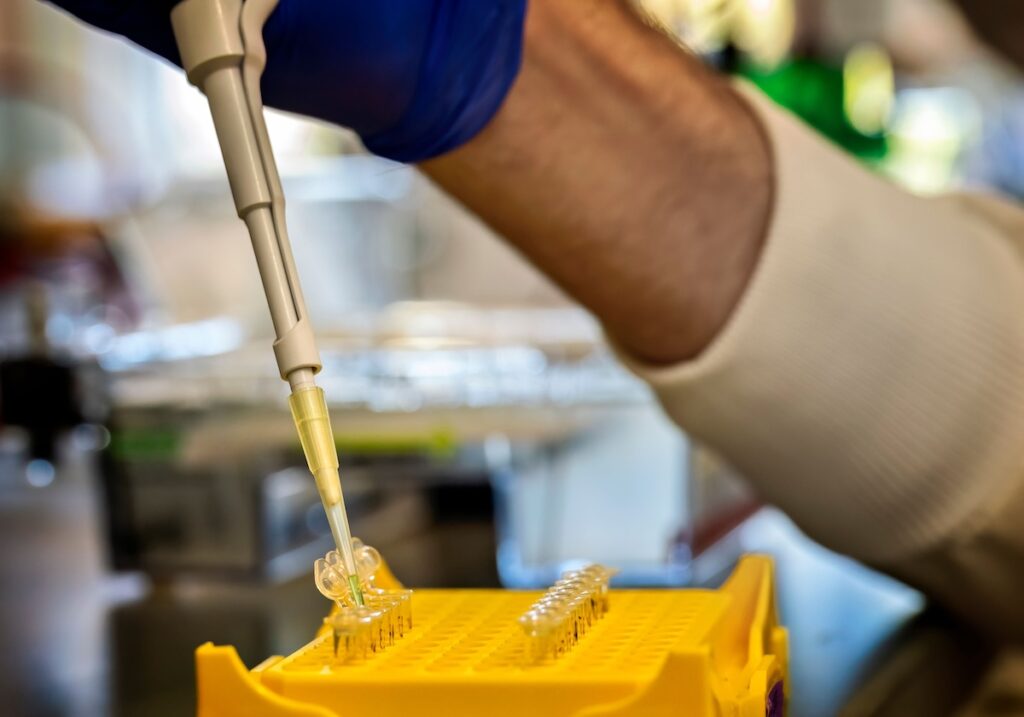
Brahim Achour
Development of Liquid Biopsy Assays for the Prediction of TKI Exposure in Cancer Patients (March 19, 2024 – Aug. 31, 2025, RI Foundation, $25,000). The award aims to develop in-house assays based on the isolation and characterization of plasma-derived extracellular vesicles to guide building pharmacokinetic models for the prediction of exposure to anticancer tyrosine kinase inhibitors.
Precision Medicine Approach for Tyrosine Kinase Inhibitors in Leukemia Patients (May 1, 2024 – April 30, 2026, RI-INBRE, NIH/NIHGMS, $200,000). The award aims to apply plasma-derived extracellular vesicles as a non-invasive liquid biopsy to guide model-informed precision dosing of anticancer tyrosine kinase inhibitors.
Jean Terrier, Brahim Achour
Physiologically Based Pharmacokinetic Modeling of Drug Exposure in Liver Disease (Sept. 1, 2025 – Aug. 31, 2027, Geneva University Hospital, $132,000). The award aims to apply clinical tissue biopsies and physiologically based pharmacokinetic models to inform pharmacotherapy of metabolic dysfunction-associated steatotic liver disease. The award is processed through Geneva University Hospitals.
Jeffrey Bratberg
COBRE on Opioids and Overdose Community Engaged Research Core (Sept. 10, 2024 – Aug. 31, 2028, National Institutes of Health/DHHS, $76,000). The goal of the Community Engaged Research Core of the COBRE is to build research infrastructure and provide services to early-stage investigators to support the recruitment and retention of vulnerable and underserved individuals as research participants. The core also aims to promote the importance of community engagement with the goal of developing more robust, rigorous, and competitive research projects.

Todd Brothers
OPTOCS-AI: Optimizing Pharmacy Transition of Care Services Using Artificial Intelligence (Feb. 22, 2024 – Dec. 31, 2025, West Virginia University through the American College of Pharmacy, $5,010). This project leverages artificial intelligence to optimize pharmacy transition of care services. By developing an AI-driven visualization tool, it enhances medication reconciliation, predicts patient readmission risks and improves pharmacist efficiency in acute and ambulatory care settings. The goal is to reduce medication errors, improve outcomes, and support evidence-based interventions for high-risk patients at discharge.
Britny Brown
BID CAP: Development of a Bidirectional Communication Tool to Optimize Adherence and Persistence to CDK4/6 inhibitors (Nov. 15, 2024 – Nov. 14, 2025, Eli Lilly and Company, $449,998). The primary objective of this Quality Improvement project is to improve adherence and persistence to cylin D kinase 4 and 6 inhibitors through the creation of a digital tool that improves bidirectional communication between patients and providers. Despite the pivotal advancements that CDK4/6 inhibitors have in hormone receptor-positive (HR+), human epidermal growth factor receptor 2-negative (HER2-) early breast cancer (EBC) and metastatic breast cancer (MBC), rates of early discontinuation reported in clinical trials have been reported as high as 25.1 percent.
Ashley Buchanan
Network-based study design, statistical, and modeling solutions for HIV among populations that use illicit substances: Informing interventions and policy in real-world settings using existing data (Sept. 15, 2024 – July 31, 2029, National Institute on Drug Abuse/NIH/DHHS, $3,501,276). Dr. Buchanan and her team will develop novel causal inference methods for evaluation of spillover effects in network-based studies with applications to human immunodeficiency virus (HIV) research. This proposed research will also advance a trial emulation approach using agent-based models to evaluate spillover effects, considering missing data and network dependence.
Bongsup Cho
RI INBRE Workforce Development Training (April 1, 2024 – March 31, 2025, RI Department of Labor & Training, $223,785). The Workforce Development Program provides trainees with biomedical skills that are valuable to the biotechnology industry. We offered a series of 14, two-and-a-half-day intensive skillset training modules on learning the principles and operation of critical bioanalytical and biomedical equipment. These short course modules were offered free of charge and provided instruction on the theory and practice of operating molecular and cellular analysis equipment. Participants who completed a training module earned a RI-INBRE-branded WDT certificate.
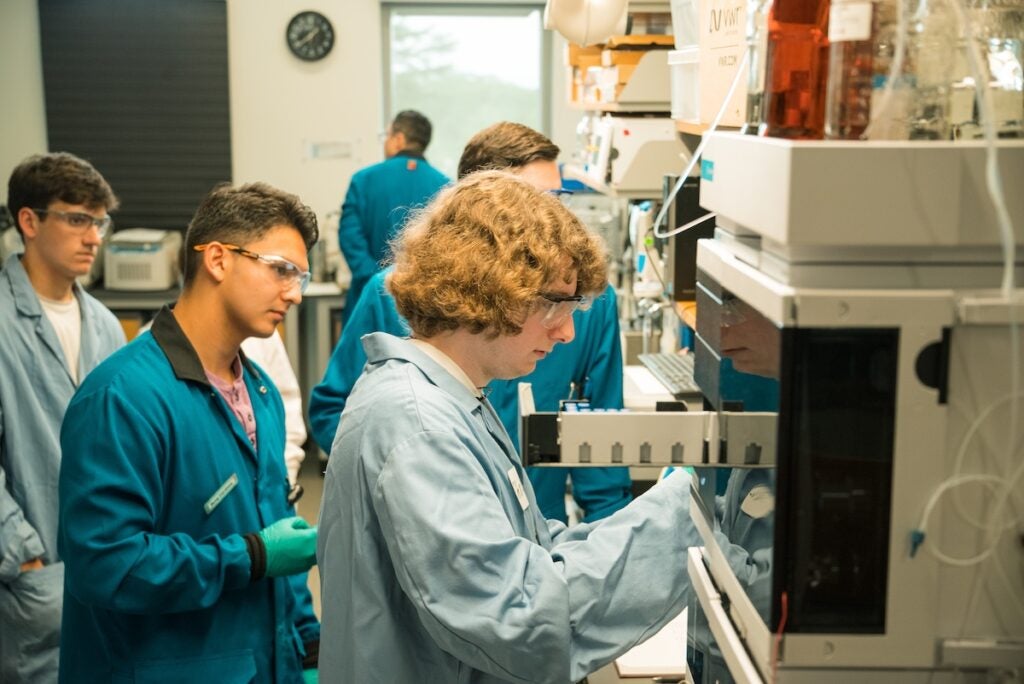
Rhode Island IDeA Network of Biomedical Research Excellence (May 1, 2024 – April 30, 2029, DHHS, National Institute of General Medical Sciences, $21,049,945). The overarching goal of the RI-INBRE is to improve institutional capacity for biomedical research excellence and student experiential training in the State of Rhode Island. RI-INBRE comprises 10 universities and colleges in RI.
Ruitang Deng
Liver Diseases and Pregnancy Complications (March 1, 2024 – Feb. 29, 2028, National Institute of Diabetes and Digestive and Kidney Diseases, $2,336,340). Our previous work demonstrated that pregnant women with liver diseases including ICP and MASLD have increased risk for pregnancy complications including preterm-birth and stillbirth. This new project is to uncover the etiological linkages between liver diseases and pregnancy complications, and to develop novel therapeutic interventions to reduce or prevent pregnancy complications for pregnant women with liver diseases.
Christine Eisenhower, Erica Estus, Anne Hume, Phillip Clark (Gerontology)
Rhode Island Geriatrics Workforce Enhancement Program (July 1, 2024 – June 30, 2029, Health Resources and Services Administration, $999,999). The purpose of the Geriatrics Workforce Enhancement Program (GWEP) is to educate and train the health care and supportive care work forces to care for older adults by collaborating with community partners. This includes maximizing patient and family engagement to address care gaps and improve health outcomes for older adults by integrating geriatrics with primary care and other appropriate specialties using the Age-Friendly Health Systems Framework.
Fabian Fischer
Guarding Innocence: Unraveling the Transfer of PFAS from Mothers to Infants via Breastfeeding (Oct. 9, 2024 – July 31, 2025, Brown University, $50,000). This project investigates how PFAS are transferred from mothers to infants via breast milk. Focusing on PFAS interactions with the efflux transporter BCRP, passive membrane permeability, and binding in serum and breast milk, the study generates mechanistic data to develop a physiologically based toxicokinetic model predicting PFAS transfer during lactation and identifying key risk factors for infants.
Nisanne Ghonem
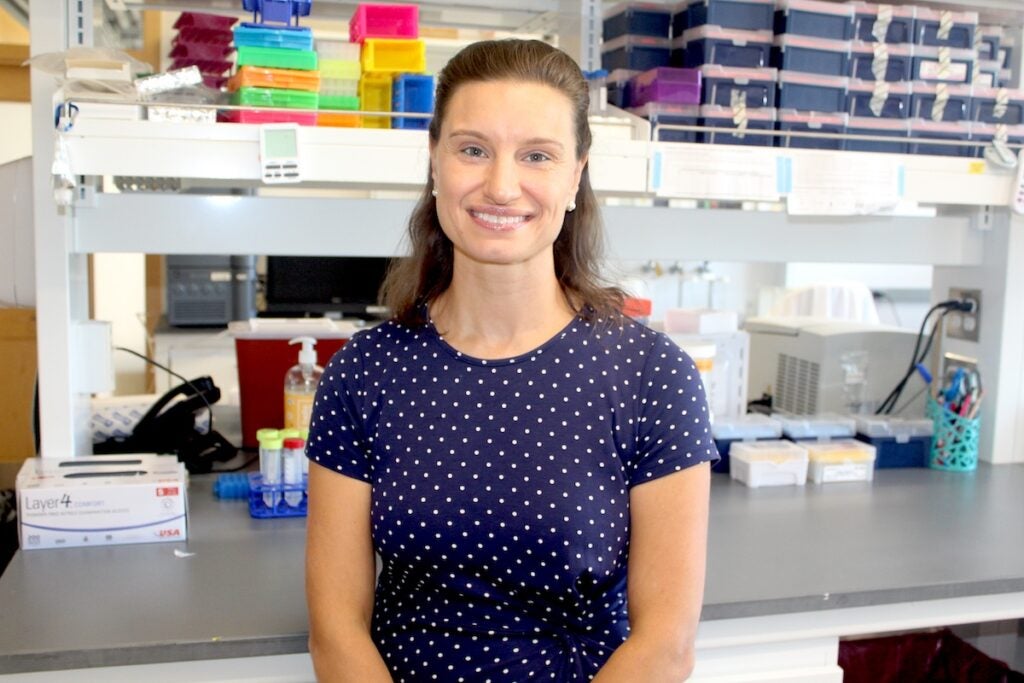
Novel mechanisms for PPAR as a target to treat cholestasis in PSC (Oct. 1, 2024 – Sept. 30, 2025, American Liver Foundation, $50,000). Primary sclerosing cholangitis (PSC) is a chronic autoimmune disease characterized by the accumulation of harmful bile acids and liver inflammation leading to fibrosis and liver failure. There is no effective therapy for PSC. This study will measure the presence of mutations in certain UGT genes responsible for eliminating harmful bile acids in PSC. This study will also test the effects of drugs called peroxisome proliferator-activated receptor activators, which are being actively studied as possible new medications to treat PSC, on UGT genes and the immune response.
Dennis Hilliard
2018 Byrne/JAG Crime Laboratory Improvement Grant (July 24, 2024 Sept. 30, 2025, US Department of Justice, $11,341). This grant was used to provide partial funding for a technician I position, training as a Firearm and Toolmark Examiner and to purchase the AFIX Comparator software tool assisting Latent Print Examiners during the identification and verification process when comparing latent prints to known prints.
Niall Howlett
Molecular Insights into Fanconi Anemia Neurological Syndrome (May 1, 2024 – April 30, 2025, RI-INBRE, NIH/NIHGMS, $70,588). The major goal of this research proposal is to gain a greater understanding of the molecular basis of central nervous system defects in Fanconi anemia. Two specific aims are proposed: We will test the hypothesis that loss of key C. elegans FA genes alter nervous system development under conditions of DNA replication stress; and we will examine the role of the FANCD2 and FANCI proteins in neuronal differentiation using SH-SY5Y neuroblastoma cells and induced pluripotent stem cells (iPSCs).
Mary-Jane Kanaczet
Mental Health First Aid at Thundermist Health Center (Jan. 1, 2024 – Dec. 31, 2024, Rhode Island Department of Labor & Training, $112,786). Front-line health workers at Thundermist Health Center will receive Mental Health First Aid certificate training. Thundermist is a Federally Qualified Community Health Center serving three communities—Woonsocket, West Warwick, and South County. This evidence-based program equips staff with skills to recognize and support patients experiencing mental health challenges. By increasing awareness and reducing stigma, this initiative enhances patient care and improves mental health outcomes for Rhode Islanders.
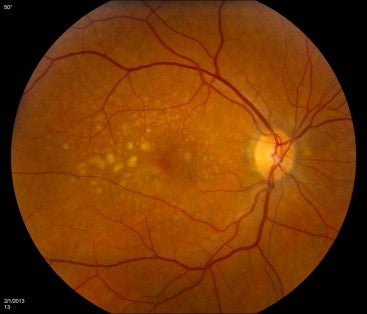
Stephen Kogut
CTC-RI CKD QI Project (May 19, 2024 – May 31, 2026, Care Transformation Collaborative of Rhode Island; United Healthcare, $30,000). In partnership with the Rhode Island Department of Health, this initiative aims to improve screening rates for retinopathy and chronic kidney disease in Rhode Island primary care using a data-driven approach leveraging ambulatory care pharmacists, and using academic detailing.
Kerry LaPlante, Haley Appaneal, Aisling Caffrey, Tom Lavoie, Ami Vyas
Nirmatrelvir/ritonavir utilization for the treatment of non-hospitalized adults with Covid-19 in the national Veterans Affairs (VA) Healthcare System (Dec. 13, 2024 – Dec. 12, 2027, Pfizer Inc., $1,392,144). Highly effective vaccines have been key in blunting the public health impact of COVID-19. However continuously updated vaccine effectiveness data are needed. Additionally, real-world evidence regarding the use of nirmatrelvir/ritonavir, the preferred outpatient treatment for mild-moderate COVID-19, are needed. This project attempts to address these key real-world evidence needs for COVID-19 vaccination and nirmatrelvir/ritonavir using data from the VA nationally.
Jennifer Lewis
Dual-Gel Vertical Electrophoresis Systems, PDI (Nov. 4, 2024 – June 30, 2025, Rhode Island Life Sciences Hub, $10,000). The grant funding will support the purchase of multiple Dual-Gel Vertical Electrophoresis Systems for addition of a hands-on laboratory exercise for the RI Biotech Boot Camp for 2025. Knowledge of SDS electrophoresis, two-dimensional electrophoresis, agarose electrophoresis, and native electrophoresis is a key technical skill requested by potential employers in the state. Electrophoresis is one of the most popular methods for separation, identification, and purification of protein and nucleic acid samples in the life sciences industry
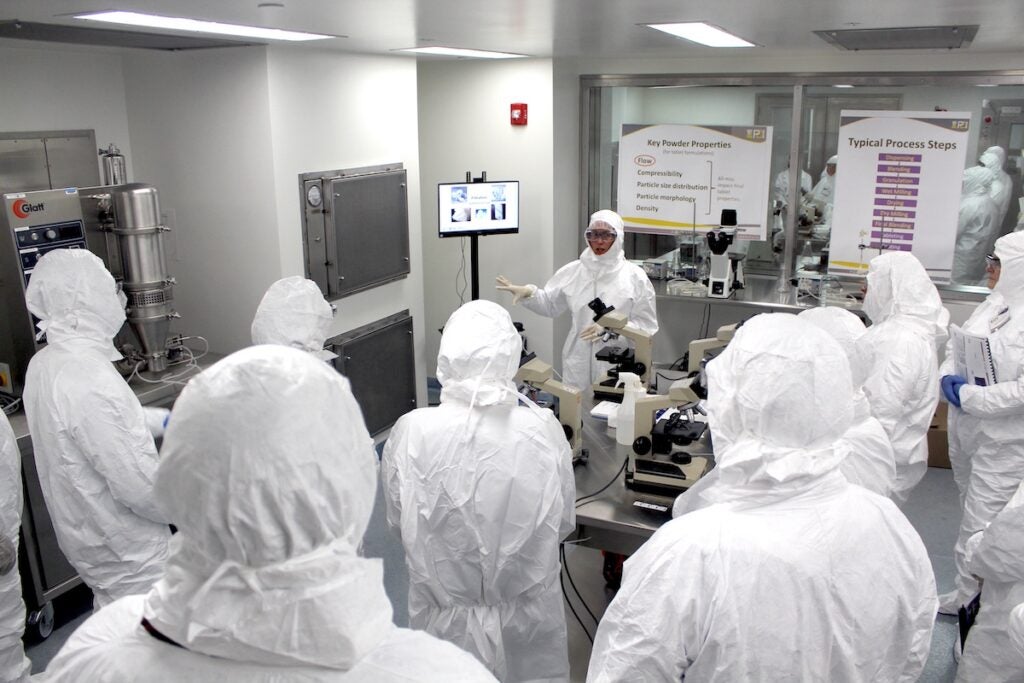
Deyu Li
Translesion synthesis and chemoresistance (May 1, 2024 – April 30, 2025, RI-INBRE, NIH/NIHGMS, $50,000). Drug resistance is a daunting challenge in chemotherapy for treating tumors. One of the resistance mechanisms is the cytotoxic DNA adducts generated from drugs are bypassed by translesion synthesis polymerases. In this project, we will test how these polymerases in tumor cells circumvent damages generated from platinum anticancer drugs. The proposed study will also provide a new platform for evaluating novel small molecule inhibitors that overcome chemoresistance.
Chang Liu
Development of a High-Throughput Screening Platform for Small Molecule Inhibitors of the PD-1/PD-L1 Using Surface Plasmon Resonance (July 1, 2024 – June 30, 2025, Rhode Island Life Sciences Hub, $10,000). This award introduces an innovative SPR-based platform for high-throughput screening of small molecule inhibitors targeting the PD-1/PD-L1 pathway. Featuring real-time kinetic monitoring and label-free detection, it enables efficient screening with minimal sample use. RILSH funding will support preliminary studies, advancing novel inhibitor discovery for cancer immunotherapy by disrupting PD-1/PD-L1 interactions.
Hang Ma
Evaluations of the bioactive compound hydroxy-sanshool against oxidative stress in skin models (Jan. 15, 2024 – July 15, 2025, Shengjia Technology Co., Ltd, $30,179). This research seeks to evaluate the antioxidant and skin protective effects of hydroxy-sanshool, a phytochemical from Sichuan peppercorns, in skin oxidative stress models with human serum albumin protein and human keratinocyte HaCaT cells.
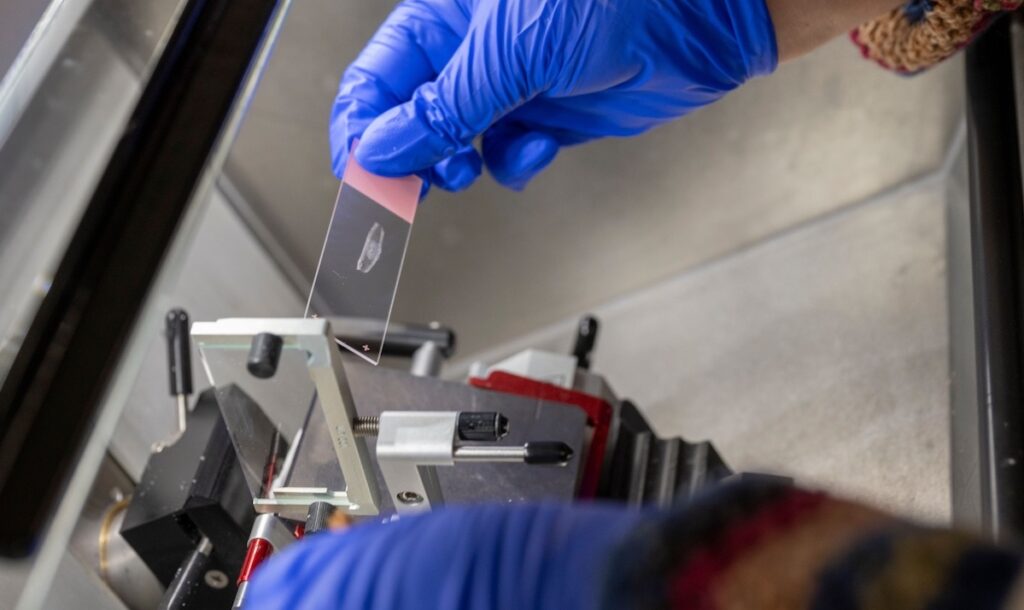
Marin Manuel
The role of propriospinal neurons in the recovery of posture after spinal cord injury (Aptil 1, 2024 – March 31, 2025, National Institutes of Health /DHHS, subaward through Northwestern, $173,441). The objective of the present application is to investigate the contribution of the V3 interneurons within the spinal cord to functional recovery after complete and incomplete injury so that future therapies can target those mechanisms, particularly in the context of recovering posture and weight bearing.
Serotonin neuron modulation after spinal cord injury (June 10, 2024 – Aug. 31, 2025, URI Foundation, $20,635). We are studying how to reduce spasticity after spinal cord injury by enhancing the serotonin system in mice. Using viral tools, we will boost serotonin activity and monitor improvements in muscle control. If successful, this approach could lead to new treatments for muscle spasms in people with spinal cord injuries.
Meghan McCormick
RI State Opioid Evaluation (March 1, 2024 – Feb. 28, 2027, Institute for Integrated Health and Innovation, $233,000). This project is funded through Opioid Settlement and has total funding of $700,000 over three years. Major activities include developing an overarching statewide opioid evaluation, providing technical assistance for state program evaluators and smaller program level evaluation, and target setting recommendations to strengthen the measurable outcomes across all pillars of the Governor’s Overdose Task Force and Opioid Settlement Advisory Committee priorities.
Jyothi Menon, Vinka Craver, Coleen Sucking, Irene Andreu, Emi Uchida, Ryan Poling-Skutvik, Joe Goodwill, Yang Lin
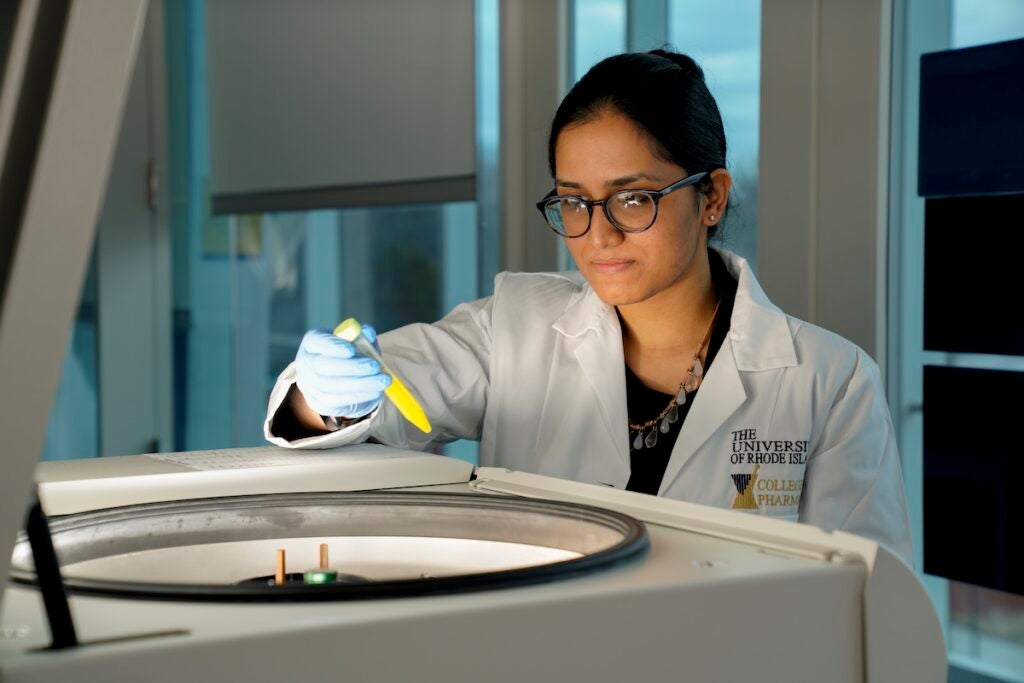
REU-Site: URI Plastic Initiative (Aug. 1, 2024 – July 31, 2027, National Science Foundation, $155,275). This 10-week, interdisciplinary Research Experience for Undergraduates program will provide the opportunity for undergraduate students to investigate and understand the causes and consequences of plastic pollution, and design and implement possible solutions.
Jyothi Menon, Cheryl Wilga
3D Bioprinted Tessellated Cartilage for Intervertebral Disc Repair (Nov. 4, 2024 – June 30, 2025, Rhode Island Life Sciences Hub, $10,000). Intervertebral disc degeneration is a major contributor to lower back pain and disability worldwide, particularly affecting middle-aged and older adults. One solution to preventing the development of adjacent segment disease is to preserve natural mobility by replacing fusion techniques with motion capable artificial discs. To address the urgent medical need for effective, safe and durable therapies to treat IVD degeneration, we propose to use state-of-the-art tissue engineering techniques to develop novel shark cartilage-inspired 3D bioprinted IVD implants.
Jaime Ross, Giuseppe Coppotelli
Novel Knock-in mtDNA Mouse Model to Study Mitochondrial Dysfunction (July 1, 2024 – June 30, 2026, National Institutes of Health/DHHS, $236,250). Mitochondrial dysfunction is common to several human diseases including liver disease, diabetes, aging and age-related diseases, but its etiology in these diseases is unclear. We propose to characterize our novel mouse model where we can finely tune MD in single tissues at specific developmental stages to investigate how tissues react and cope with MD in health and disease states.
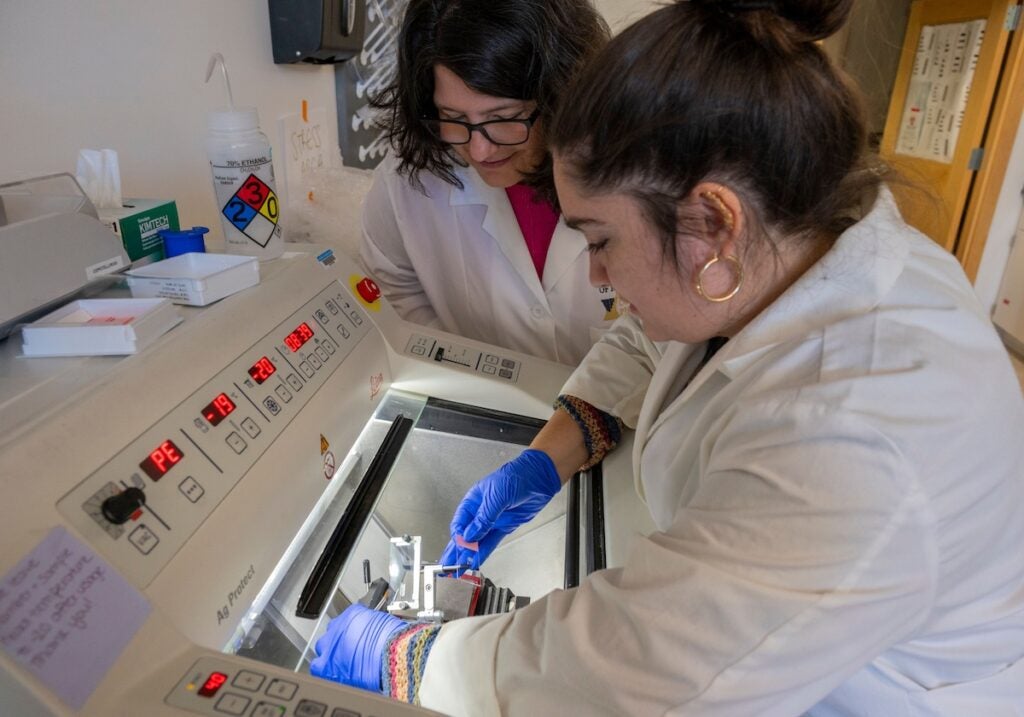
David Rowley
Peptide cues in the environment regulate bacterial dormancy (Sept. 1, 2024 Aug. 31, 2027, National Institutes of Health, subaward through Salve Regina University, $184,275). This project will investigate how molecules that are derived from the bacterial cell wall regulate bacterial growth decisions using the paradigm of bacterial dormancy in a prototypic uropathogenic strain of Escherichia coli. This research will identify the pharmacophore of the cell wall signal, or cue, elucidate genes that enable the bacterial response to the signal, and identify bacterial protein targets that engage the signal to further understand the underlying mechanism of bacterial crosstalk.
Joseph Schrader
Induction of Neutrophil Extracellular Traps by Beta-Amyloid Deposits in Cerebral Amyloid Angiopathy (June 1, 2024 – May 31, 2026, National Institute on Aging/NIH/DHHS, $315,000). This study is investigating the role of Neutrophil Extracellular Traps in the progression of Cerebral Amyloid Angiopathy. This involves investigating whether neutrophils are directly activated by amyloid beta fibrils and directly stimulated to produce NETs in-vitro, as well as defining a time course for NETosis across CAA pathological progression in a rat model of CAA using proteomics and histopathological analysis.
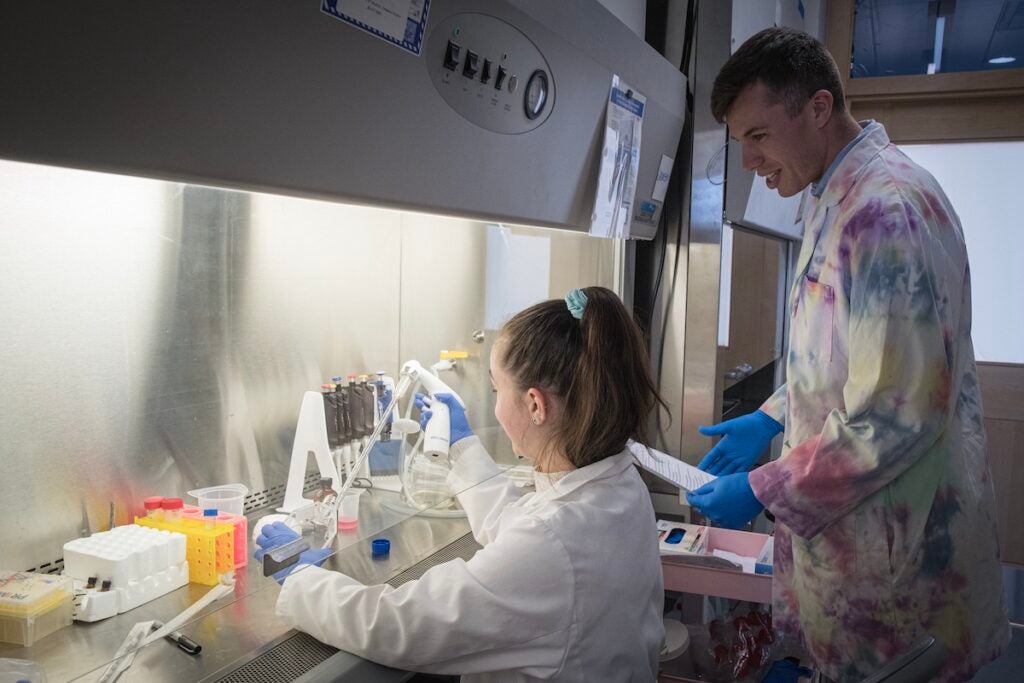
Joseph Schrader, Chang Liu
Impact of Cannabidiol and Hemp Extract on Vascular Pathology in Cerebral Amyloid Angiopathy (Oct. 1, 2024 – May 31, 2025, Ocean State Research Institute, $75,000). This preclinical trial is investigating the therapeutic potential of CBD and hemp extract for the treatment of Cerebral Amyloid Angiopathy-related inflammation, by treating CAA model rats with CBD for 1 month, and investigating molecular and pathological changes via multi-omics and histopathological analysis. Investigation also includes defining a molecular signature of amyloid beta-induced changes in human brain microvascular endothelial cells in-vitro, and the potential for CBD to inhibit those molecular alterations.
William Van Nostrand
Impact of ApoE in Novel Rat Models of Late-Onset AD (Feb. 15, 2024 – Nov. 30, 2025, National Institutes of Health/DHHS, $409,500). Apolipoprotein E4 is recognized as a strong risk factor for the development of late-onset Alzheimer’s disease. To better understand the impact of ApoE genotype on the emergence and progression of LOAD and to effectively evaluate therapeutic interventions for this condition, appropriate experimental animal models are needed. The overall goal of this exploratory proposal is to study the impact of ApoE genotype on the emergence and progression of LOAD pathologies and cognitive impairment using a novel gene-edited rat model used to generate bigenic CrHuA/hApoE3 and CrHuA/hApoE4 rats.
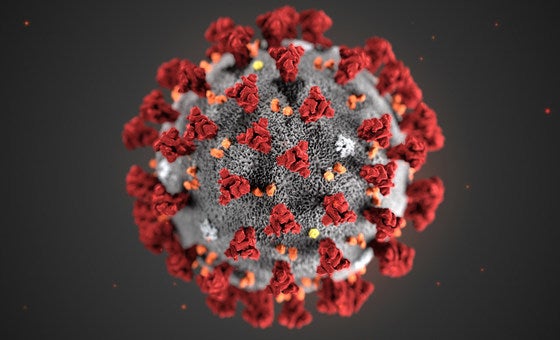
Impact of SARS-Cov-2 on a Rat Model Cerebral Amyloid Angiopathy (Sept. 15, 2024 – May 31, 2026, National Institute on Aging, $433,125). SARS-2-CoV-2 (COVID-19) remains a highly endemic infectious disease in the U.S. and can cause serious cerebral vascular disease. Cerebral amyloid angiopathy, a common cerebral small vessel disease and cause of stroke in the elderly, is influenced by apolipoprotein E genotype. The purpose of this project is to evaluate how SARS-2-CoV-2 impacts the pathogenesis of CAA and the influence of ApoE genotype.
A Translational Approach Towards Understanding Brain Waste Clearance in Cerebral Amyloid Angiopathy (Jan. 1, 2024 – Dec. 31, 2028, Leducq Foundation for Cardiovascular Research, $126,500). This award is to support a trans-Atlantic network involving several laboratories in the United States and several in Europe. The goal of this network is to investigate the role of brain waste clearance mechanisms in the development of cerebral amyloid angiopathy using a combination of neuroimaging approaches in humans and in preclinical rodent models of disease.
Ami Vyas, Haley Appaneal
Systemic Literature Review on the Effectiveness, Safety, Health Care Resource Utilization, and Economic Benefits of Extended Use of Letermovir among Hematopoietic Stem Cell Transplant Recipients (Oct. 11, 2024 – Oct. 17, 2025, Merck & Co., Inc., $75,336). This project aims to comprehensively synthesize evidence on real-world effectiveness, safety and economic benefits of extended use of letermovir in patients undergoing hematopoietic stem cell transplantation. Additionally, we aim to perform meta-analyses for several CMV-specific outcomes such as CMV reactivation, clinically significant CMV infection, CMV disease, and non-relapse and all-cause mortality.
Xuerong Wen
Access and Safety of Opioid Agonist Therapy in Pregnant Women (March 1, 2024 – Aug. 31, 2025, Rhode Island Foundation, $20,000). This study uses a large health administrative data set consisting of linked mother-infant dyads to examine access and safety of opioid agonist therapy in pregnant women with opioid use disorders. The study findings will provide real-world evidence to support optimized OUD management among pregnant women with OUD, with the goal of preventing potential harm to both the mother and the fetus.
Safety of the Use of Prescription Opioids and Antidepressants During Pregnancy (Jan. 15, 2024 – June 30, 2025, URI Computational Research Interdisciplinary Seed Award, $25,000). Concurrent use of prescription opioids and antidepressants among pregnant women raises significant questions about the consequences of use on child development. This study examines how opioid-related exposure during pregnancy impacts maternal and infant health. Study findings will inform clinical decision making on the management of co-morbid chronic pain and depression in pregnant women.
On-going awards
Jessica Alber
Longitudinal validation of retinal biomarkers against cerebral imaging in preclinical Alzheimer’s disease (Sept. 9, 2022 – May 31, 2027, National Institute on Aging/NIH/DHHS)
Jeffrey Bratberg
Pharmacy-Based Buprenorphine Induction and Maintenance: A Real-World Demonstration Project (Jan. 15, 2023 – Sept. 14, 2025, Foundation for Opioid response Efforts)
Ashley Buchanan
Developing causal inference methods to evaluate and leverage spillover effects through social interactions for designing improved HIV prevention interventions (July 20, 2023 – May 31, 2028, National Institutes of Health/DHHS, subaward through Yale University)
Aisling Caffrey
Advance Clinical and Translational Research- CTR Core (Aug. 1, 2021 – July 31, 2025, National Institute of Health/DHHS, subaward through Brown University)
Comparative Effectiveness and Complications of Intravenous Ceftriaxone Compared with Oral Doxycycline in Lyme Meningitis (March 1, 2022 – Aug. 31, 2026, National Institutes of Health /DHHS with subaward through Boston Children’s Hospital)
Aisling Caffrey, Kerry LaPlante
Real World Evidence for Covid-19 Antiviral Therapy in the Veterans Health Administration (Oct. 1, 2022 – July 31, 2024, Pfizer, subaward through Ocean State Research Institute)
Bongsup Cho
Rhode Island IDeA Network of Biomedical Research Excellence (Sept. 1, 2001 – May 8, 2024, RI Department of Labor and Training)
Nanoparticle-mediated drug delivery for inflammatory Arthritis (March 30, 2001 – April 30, 2024, National Institute of General Medicine)
Cloud-Based Learning Module for Biomarker Discovery (Sept. 30, 2001 – April 30, 2024, National Institute of General Medicine)
Richard Clements
The mechanisms and roles of mitochondria dysfunction in cardiac arrhythmogenesis (Aug. 1, 2023 – June 30, 2028, National Institutes of Health/DHHS, subaward through Ohio State University)
Cardiopulmonary Vascular Biology COBRE (Sept. 3m 2023 – May 31, 2025, National Institutes of Health, subaward through Ocean State Research Institute)
Claudia Fellini
Dissecting the molecular link between stroke, actin and Alzheimer’s disease (Sept. 22, 2023 – Aug. 31, 2025, National Institutes of Health/DHHS
Defining the Mechanisms and Consequences of Nuclear Defects in ALS/FTD April 1, 2021 – May 31, 2025, National Institute of Neurological Disorders and Stroke/NIH/DHHS)
Nisanne Ghonem
Treatment with Treprostinil to regulate hemodynamics during renal ischemia-reperfusion (Dec. 3, 2022 – Dec. 2, 2025, United Therapeutics Corporation)
Evaluation of the preliminary safety and efficacy of Treprostinil in reducing ischemia-reperfusion injury during de novo adult kidney transplantation (March 30, 2022 – June 30, 2029, Rhode Island Hospital)
Dennis C Hilliard
State Crime Laboratory Enhancement Program (Oct. 2, 2023, Bureau of Justice Assistance/Department of Justice)
Anita Jacobson
First Responders Naloxone Training (May 1, 2023 – Aug. 19, 2026, Rhode Island Department of Health)
URI Community First Responder Program (Sept. 30, 2022 – Sept. 30, 2025, Substance Abuse and Mental Health Services Administration)
Community First Responder Program (Feb. 14, 2022 – Aug. 31, 2025, Rhode Island Department of Health)
Mary-Jane Kanaczet, Bongsup Cho
RI-INBRE Workforce Development and Training Program (Aug. 28, 2023 – Dec. 31, 2024, Rhode Island Department of Labor & Training)
Steve Kogut
Advanced Clinical and Translational Research (Aug. 1, 2021 – Ju;ly 31, 2026, National Institutes of Health, subaward through Brown University)
Improving Population Health/Reducing Low Value Care in Primary Care through Ambulatory Blood Pressure Monitoring and Professional Use of Continuous Glucose Monitoring (May 23, 2022 – July 31, 2024, Care Transformation Collaborative of Rhode Island, Inc.)
Deyu Li
Etheno adductome and repair pathways (March 1, 2023 – Feb. 28, 2028, National Institute of Health)
Etheno adductome and its mutational spectra (May 1, 2023 – April 30, 2024, Rhode Island Foundation)
Rita Marcoux, Lisa Szumita
Rhode Island Department of Corrections of Clinical Pharmacy Oversight (March 10, 2023 – Dec. 31, 2027, Rhode Island Department of Corrections)
URI College of Pharmacy Healthcare Utilization Management Center (Oct. 20, 2009 – Dec. 31, 2029, Rhode Island Department of Corrections
Marin Manuel
Transcriptomic Profile of Functionally Identified Mouse Spinal Motoneurons (Sept. 14, 2023 – June 30, 2024, Brown University)
Motonueron mortality in neurodegenerative diseases induced by homeostatic dysregulation of excitability (June 1, 2023 – May 31, 2025, National Institutes of Health)
Samantha A Meenach
ESTEEMED Scholars Program (May 1, 2023 – April 30, 2025, National Institutes of Health/DHHS)
Jyothi Menon, Angela Slitt, Xueron Wen
Nanoparticle-mediated targeting of hepatic macrophages to mitigate inflammation in alcoholic liver disease (March 20, 2022 – Feb. 28, 2024, National Institutes of Health)
Jyothi Menon, Ruitang Deng and Ami Vyas
Multifunctional Nanoparticle Platform to Prevent Alcohol-Associated HCC Development (July 3, 2023 – June 30, 2028, National Institutes of Health/DHHS)
Jyothi Menon
Evaluation of Inflammatory Effects of Microplastics on 3D Tissue-Engineered Liver Models (June 1, 2-23 – April 30, 2025, RI-INBRE, NIH/NIHGMS)
Katharina Quinlan and Marin Manuel
Serotonin Based Therapeutic in Cerebral Palsy (Aug. 8, 2023 – July 31, 2028, National Institutes of Health/DHHS)
Katharina Quinlan
RI – TRPV4 Links the Blood-Nerve Barrier to Motor Neuron Dysfunction (May 5, 2021 – April 30, 2024, Subaward from Johns Hopkins University)
Impairment of Spinal Development in Cerebral Palsy (Sept. 1, 2017 – May 31, 2028, National Institute of Neurological Disorder and Stroke)
Validation of Prenatal Rabbit Hypoxia Ischemia as a Model of Cerebral Palsy-Induced Pain (Sept. 9, 2023 – Aug. 31, 2026, National Institute of Neurological Disorders and Stroke)
Jamie Ross
The Role of Epigenetics in Age-Related Cognitive Decline and Alzheimer’s Disease (June 1, 2022 – May 31, 2024, National Institutes of Health)
Dave Rowley
Hands-on Education and Research for Biomedical and Analytical Learning (July 3, 2023 – June 30, 2028, National center for Complementary and Integrative Health)
Molecular Mechanisms of Interspecies Interactions in Mitigating Aquaculture Diseases (APRIL 14, 2024 – PARIL 13, 2026, United States Department of Agriculture, National Institute of Food and Agriculture)
Hang Ma
Maple Syrup as a Functional, Hero Ingredient: Leveraging Culinary Nutrition, Food Science Innovation, and Chemistry Insights to Increase Maple Syrup Consumption (Sept. 30, 2022 – Sept. 29, 2025, Agricultural Marketing Service/US Department of Agriculture)
Angela L Slitt
Shifting paradigms to emerging toxins in freshwater cyanobacterial blooms (Sept. 1, 2023 – Aug. 31, 2025, National Institute of Environmental Health Sciences/NIH/DHHS)
URI STEEP Center of Excellence for PFAS Detection and Training (July 1, 2017 – June 30, 2025, National Institute of Standards & Technology/Technology Administration/DOC)
Lynn Taylor
Optimization and multi-site feasibility of yoga for chronic pain in people in treatment for opioid use disorder (Dec. 1, 2022 – March 31, 2-25, National Institutes of Health, with subaward through Butler Hospital)
William E Van Nostrand, Joseph Schrader
Effect of ApoE Genotype in a Novel Rat Model of Cerebral Amyloid Angiopathy (April 1, 2023 – March 31, 2025, Cure Alzheimer’s Fund)
CAA Biomarker Investigation (Dec. 4, 2023 – Nov. 30, 2025, Eli Lilly and Company)
Tracey H Taveira
Longterm outcomes of antipsychotic medication use in Veterans with PTSD (Sept. 1, 2023 – Aug. 31, 2027, US Army Medical Research and Material Command)
Ami Vyas
Social Determinants of Health and Systemic Lupus Erythematosus: A Nationally Representative Analysis (April 21, 2023 – Sept. 30, 2025, Merck & Co., Inc.)
